- Home
- Neil Gaiman
The View from the Cheap Seats Page 13
The View from the Cheap Seats Read online
Page 13
He grins. “I got the idea for the writer in Bag of Bones having books because somebody told me years ago that every year Danielle Steel wrote three books and published two, and I knew Agatha Christie had squirreled a couple away, to put a final bow on her career. As of right now, if I died and everybody kept it a secret, it would go on until 2013. There’s a new Dark Tower novel, The Wind Through the Keyhole. That comes out soon, and Doctor Sleep is done. So if I got hit by a taxicab, like Margaret Mitchell, what wouldn’t be done, what would be done. Joyland wouldn’t be done but Joe could finish it, in a breeze. His style is almost indistinguishable from mine. His ideas are better than mine. Being around Joe is like being next to a Catherine wheel throwing off sparks, all these ideas. I do want to slow down. My agent is dickering with the publishers about Doctor Sleep—that’s the sequel to The Shining—but I held off showing them the manuscript because I wanted time to breathe.”
Why would he write a sequel to The Shining? I do not tell him how much that book scared me when I was sixteen, nor how much I loved and at the same time was disappointed by the Kubrick movie.
“I did it because it was such a cheesed-off thing to do. To say you were going back to the book that was really popular and write the sequel. People think of that book, they read it as kids. Kids read it and say it was a really scary book, and then as adults they might read the sequel and think, This isn’t as good. The challenge is, maybe it can be as good—or maybe it can be different. It gives you something to push up against. It’s a challenge.
“I wanted to write Doctor Sleep because I wanted to see what would happen to Danny Torrance when he grew up. And I knew that he would be a drunk because his father was a drunk. One of the holes it seemed to me in The Shining is that Jack Torrance was this white-knuckle dry drunk who never tried one of the self-help groups, like Alcoholics Anonymous. I thought, okay, I’ll start with Danny Torrance at age forty. He is going to be one of those people who says ‘I am never going to be like my father, I am never going to be abusive like my father was.’ Then you wake up at thirty-seven or thirty-eight and you’re a drunk. Then I thought, what kind of a life does a person like that have? He’ll do a bunch of low-bottom jobs, he’ll get canned, and now he works in a hospice as a janitor. I really want him to be a hospice worker because he has the shining and he can help people get across as they die. They call him Dr. Sleep, and they know to call for him when the cat goes into their room and sits on their bed. This was writing about a guy who rides the bus, and he’s eating in a McDonald’s, or on a special night out maybe Red Lobster. We are not talking about a guy who goes to Sardi’s.”
Stephen and Tabitha met in the stacks of the University of Maine library in 1967, and they married in 1971. He couldn’t get a teaching position when he graduated, so he worked in an industrial laundry and pumped gas, and worked as a janitor, supplementing his meager income with occasional stories, mostly horror, sold to men’s magazines with names like Cavalier. The couple was dirt poor. They lived in a trailer, and King wrote at a makeshift desk between the washer and the dryer. All that changed in 1974, with the paperback sale of Carrie for $200,000. I wonder how long it has been since King has stopped worrying about money.
He thinks for a moment. “Nineteen eighty-five. For a long time Tabby understood that we didn’t have to worry about these things. I didn’t. I was convinced they would take all this away from me, and I was going to be living with three kids in a rental house again, that it was just too good to be true. Around about 1985 I started to relax and think, This is good, this is going to be okay.
“And even now this”—he gestures, taking in the swimming pool, the guesthouse, the Florida key and all the many McMansions—“is all very strange to me, even though it’s only three months of the year. Where we live in Maine is one of the poorest counties. A lot of the people we see and hang with cut wood for a living, drive trash, that sort of thing. I don’t want to say I have the common touch, but I am just a common person, and I have this one talent that I use.
“Nothing bores me more than to be in New York and have a dinner in a big fancy restaurant, where you have to sit for three fucking hours, you know, and people will have drinks before, wine after, then three courses, then they want coffee and someone is going to ask for a fucking French press and all the rest of this crap. To me my idea of what’s good is to drive here and go to Waffle House, get a couple of eggs and a waffle. When I see the first Waffle House, I know I’m in the South. That’s good.
“They pay me absurd amounts of money,” he observes, “for something that I would do for free.”
STEPHEN KING’S FATHER went out for cigarettes when King was four, and he never came back, leaving King to be brought up by his mother. Steve and Tabby have three children: Naomi, a Unitarian minister with a digital ministry; Joe and Owen, both writers. Joe is finishing his third novel. Owen’s first novel is coming out in 2013.
I wonder about distance and change. How easy is it to write about characters who are working blue-collar jobs in 2012?
“It is definitely harder. When I wrote Carrie and ’Salem’s Lot, I was one step away from manual labor. But it’s like also true—Joe is going to find out this is true, that when you have small children of a certain age, it is easy to write about them because you observe them and you have them in your life all the time.
“But your kids grow up. It is harder for me to write about this little twelve-year-old girl in Doctor Sleep than it ever was for me to talk about five-year-old Danny Torrance because I had Joe as a model for Danny. I don’t mean that Joe has the shining like Danny but I knew who he was, how he played, what he wanted to do and all that stuff. But look, here’s the bottom line: if you can imagine all the fabulous stuff that happened in American Gods, and if I can imagine magic doors and everything, then surely I can still put my imagination to work and go: look, this is what I imagine it’s like to work a ten-hour day in a blue-collar job.”
We’re doing the writer thing, now: talking about craft, about how we do what we do, making things up for a living, and as a vocation. His next book, The Wind Through the Keyhole, is a Dark Tower novel, part of a sequence that King plotted and began when he was little more than a teenager himself. The sequence took him years to finish, and he only finished spurred on by his assistants, Marsha and Julie, who were tired of fielding fan letters asking when the story would be completed.
Now he’s finished the story he is trying to decide how much he can rewrite it, if he views the sequence as one very long novel. Can he do a second draft? He hopes so. Currently, Stephen King is a character in the fifth and sixth Dark Tower books, and Stephen King the nonfictional author is wondering whether to take him out in the next draft.
I told him about the peculiarity of researching the story I was working on, that everything I needed, fictionally, was waiting for me when I went looking for it. He nods in agreement.
“Absolutely—you reach out and it’s there. The time that it happened the clearest was when Ralph, my agent then, said to me, ‘This is a bit crazy, but do you have any kind of idea for something that could be a serialized novel like Dickens used to do?,’ and I had a story that was sort of struggling for air. That was The Green Mile. And I knew if I did this I had to lock myself into it. I started writing it and I stayed ahead of the publication schedule pretty comfortably. Because . . .” He hesitates, tries to explain in a way that doesn’t sound foolish. “. . . Every time I needed something that something was right there to hand. When John Coffey goes to jail—he was going to be executed for murdering the two girls. I knew that he didn’t do it, but I didn’t know that the guy who did do it was going to be there, didn’t know anything about how it happened, but when I wrote it, it was all just there for me. You just take it. Everything just fits together like it existed before.
“I never think of stories as made things; I think of them as found things. As if you pull them out of the ground, and you just pick them up. Someone once told me that that was me lowballing my o
wn creativity. That might or might not be the case. But still, on the story I am working on now, I do have an unresolved problem. It doesn’t keep me awake at night. I feel like when it comes down, it will be there . . .”
King writes every day. If he doesn’t write he’s not happy. If he writes, the world is a good place. So he writes. It’s that simple. “I sit down maybe at quarter past eight in the morning and I work until quarter to twelve and for that period of time, everything is real. And then it just clicks off. I think I probably write about twelve hundred to fifteen hundred words. It’s six pages. I want to get six pages into hard copy.”
I START TO tell King my theory, that when people in the far future want to get an idea of how things felt between 1973 and today, they’ll look to King. He’s a master of reflecting the world that he sees, and recording it on the page. The rise and fall of the VCR, the arrival of Google and smartphones. It’s all in there, behind the monsters and the night, making them more real.
King is sanguine. “You know what, you can’t tell what is going to last, what’s not going to last. There’s a Kurt Vonnegut quote about John D. MacDonald saying, ‘Two hundred years from now, when people want to know what the twentieth century was like they’ll go to John D. MacDonald,’ but I’m not sure that’s true—it seems like he’s almost been forgotten. But I try and reread a John D. MacDonald novel whenever I come down here.”
Authors populate the cracks in a conversation with Stephen King. And, I realize, all of them are, or were, popular authors, people whose work was read, and read with enjoyment, by millions.
“You know what’s bizarre? I did the Savannah book fair last week . . . This is happening to me more and more. I walked out and I got a standing ovation from all these people, and it’s like a creepy thing . . . either you’ve become a cultural icon, or they are applauding the fact that you are not dead yet.”
I tell him about the first time I ever saw a standing ovation in America. It was for Julie Andrews in Minneapolis on a tryout tour of Victor/Victoria. It was not very good, but she got a standing ovation for being Julie Andrews.
“That’s so dangerous though, for us. I want people to like the work, not me.”
And the lifetime achievement awards?
“It makes them happy to give them to me. And they go out in the shed, but the people don’t know that.”
Then Tabby King turns up to tell us that it is time for dinner, and she adds that back at the big house the gargantuan African spurred tortoise has just been discovered trying to rape a rock.
* * *
This interview originally ran in edited form in the UK Sunday Times, April 8, 2012.
* * *
Geoff Notkin: Meteorite Man
Some people change. Kids you knew at school become investment bankers or bankruptcy specialists (failed). They fatten and they bald and somewhere you get the sense that they must have devoured the child they once were, eaten themselves bit by bit, mouthful by mouthful, until nothing is left of the smart, optimistic dreamer you knew when you were both young.
On a bad day, I worry that it’s happening to me.
And then I see Geoff Notkin, and everything’s all right.
True, sometimes, when he looks in the right direction, I see his father, Sam Notkin, a man so cool we used to talk obscure 1940s American science fiction authors together. But mostly I see Geoff, and he hasn’t changed.
Geoffrey Notkin in 1976 was impetuous, brilliant, obsessed, really funny, easily angered but someone who would just as quickly forget that he’d ever been angry. We were both outsiders at school, Geoff because he was semi-American, me because I lived in books, and we bonded over music and comics. I took Geoff to a Lou Reed concert at the New Victoria, and we started a punk garage band, literally in his garage. Geoff was a terrific and passionate drummer.
We drew comics together, in the back of classes that bored us. Most classes bored us. We were smart kids who ignored most of school (we both liked the art rooms, I liked the school library) and taught ourselves, because that seemed like more fun. We liked being disliked by the teachers, and neither of us actually got around to graduating.
We were friends. We dated the same girls (although never at the same time). We read the same comics and listened to the same music (often at the same time) and even dyed our hair blond, or tried to. Geoff’s parents did not mind that he had dyed his hair blond. My father minded that I had dyed my hair a straw orange, and made me dye it black, which was even stranger. We signed to a record label as young punks, and none of our music is around anywhere except possibly tapes somewhere in Geoff’s storage lockers, and I like to think that as long as I get him this introduction on deadline any tapes will stay there. Geoff put me into the ambulance when I needed to get my faced stitched up after a grumpy punter expressed his dislike of our band by throwing an (unopened) beer can at me . . .
I think it was after the beer can incident that I stopped dreaming of being a rock star.
I would see Geoff every few years, our lives strobing: the last time I saw his parents, introducing them to my infant daughter Holly, and finding that I had been forgiven for the unfortunate events of the night of Geoff’s party; the all-consuming envy of Geoff for inking Will Eisner at the School of Visual Arts, of knowing Will Eisner and Art Spiegelman and Harvey Kurtzman, people who were the gods and demigods of a twenty-four-year-old journalist in London who dreamed of one day doing comics; Geoff Notkin rocking-man-about-town as I started stumbling into New York as someone who made his living writing comics; and then the e-mails from Geoff, in which he was going off to Siberia to look for meteorites . . .
Truthfully, it had never occurred to me that anyone actually ever looked for meteorites. I assumed that you noticed them when they hit your house or your car, or landed, green and pulsing, in your meadow before they transformed you into something monstrous. I did not think that people went out and looked for them with rare-earth magnets and madness.
I watched Meteorite Men because Geoff was on it, and I was delighted to observe that Geoff is still, so obviously that it comes through the television screen, impetuous, brilliant, obsessed, truly funny, and capable of losing his temper really entertainingly whenever he’s frustrated and of forgetting and forgiving almost instantly. But I kept watching it because I was hooked: Geoff has an autodidact’s love of knowledge. He does not stop marveling at the universe, and, for Geoffrey Notkin, the quickest way to touch the rest of the universe is to find something that came from another part of it and landed here, like a meteorite.
He gave me a meteorite of my own for my fiftieth birthday. It has a hole in it.
And in my head, it’s still 1977 somewhere, and Geoff Notkin and I have taken the afternoon off school to hit the secondhand book stores, and some record stores that have the real American punk imports that Geoff loved and the Velvet Underground bootlegs I dreamed about, and Geoff is standing on the side of the road shouting, “We mean it, mannnnnnn,” at the cars going by, and we are kids in school uniforms and it’s also now, thirty-five years later, and nothing’s changed.
He still means it, every word.
* * *
This was my introduction to Geoff’s memoir Rock Star: Adventures of a Meteorite Man, 2012.
* * *
About Kim Newman, with Notes on the Creation and Eventual Dissolution of the Peace and Love Corporation
It was October 1983, I think, and I was twenty-two, and it was the room upstairs in the Royal Connaught pub in Holborn, and the British Fantasy Society was having one of its dos. It was the first of the dos I’d attended. BFS Social Nights are occasional events, where authors and fans and critics and people from the twilight worlds of publishing and movies get together and drink too much and talk a lot. There’s no agenda, no speeches, nothing more organized than an occasional raffle.
Someone—probably editor and journalist Jo Fletcher—introduced me to a man wearing a white hat and a crisp black suit. He had a handlebar moustache and a pocket watch on an h
onest-to-goodness watch chain across his waistcoat. He was drinking a white wine spritzer and had total self-assurance. He was twenty-three, but came across somehow as much older. He looked like he should be carrying a swordstick, although, for reasons I was not to discover for some time, he wasn’t.
Kim and I were both young and we were both quite full of ourselves—in hindsight we were probably insufferable. We compared credentials: he’d just had a story accepted by Interzone (it was, if memory serves, “Patricia’s Profession”) and I’d just had a story rejected by Interzone and accepted by Imagine magazine. (And his story is in this collection, and is pretty damn good, and I just reread mine and decided not to include it in a collection of my short fiction because it was pretty terrible.) We were both young, although with me it showed, and with Kim it didn’t, and we were both hungry.
And then the conversation lurched around to books we were going to write. Kim started telling me about a book he had planned called The Set. It was going to be about giant badgers going around England eating people. And I told Kim that I thought I’d quite like to do a book of science fiction quotations.
“That sounds like a good idea,” said Kim. “You can do the books bit. I’ll write the film section.” Kim was a film reviewer and critic, writing for City Limits and the British Film Institute Journal. He’d already written a book called Nightmare Movies, which had yet to be published by a soon-to-be-bankrupt and rather dodgy publisher (and which would eventually be revised and updated and become the definitive reference work on post-Hammer horror).
That’s what I remember, anyway. That was how Kim entered my life. So we wrote an outline for our proposed book of quotations, and knowing Kim, and knowing me, he finished his half of the outline before I started to write mine. We sent the outline for Ghastly Beyond Belief out to a few publishers, and Arrow bought it, and my collaboration with Kim Newman had officially begun.

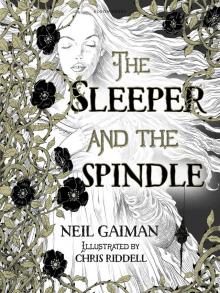 The Sleeper and the Spindle
The Sleeper and the Spindle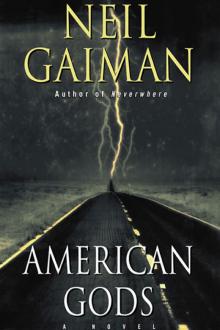 American Gods
American Gods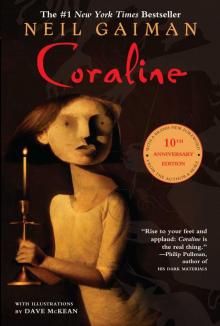 Coraline
Coraline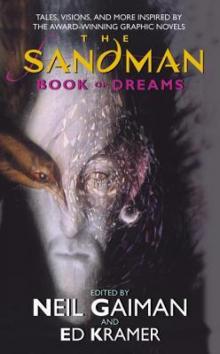 The Sandman: Book of Dreams
The Sandman: Book of Dreams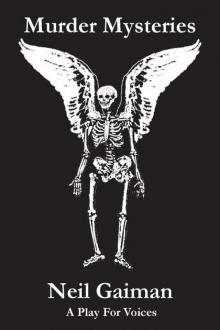 Murder Mysteries
Murder Mysteries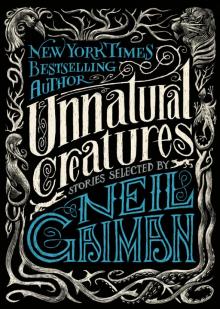 Unnatural Creatures
Unnatural Creatures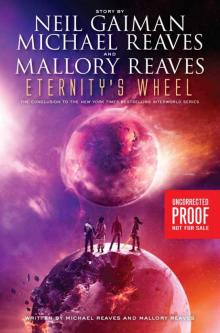 Eternity's Wheel
Eternity's Wheel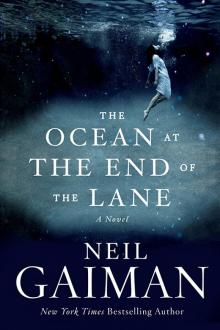 The Ocean at the End of the Lane
The Ocean at the End of the Lane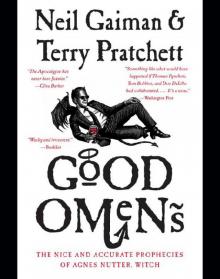 Good Omens
Good Omens Stardust
Stardust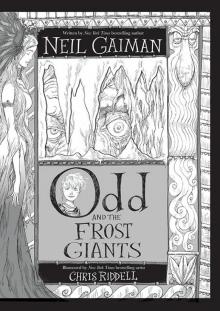 Odd and the Frost Giants
Odd and the Frost Giants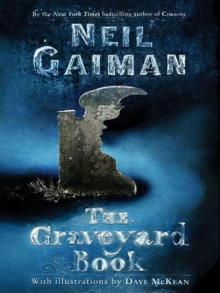 The Graveyard Book
The Graveyard Book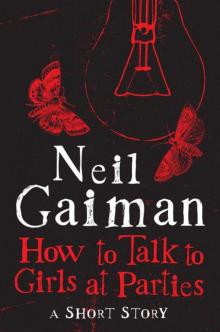 How to Talk to Girls at Parties
How to Talk to Girls at Parties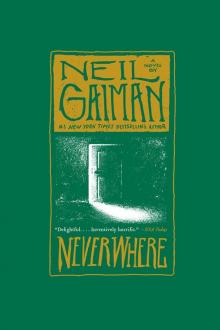 Neverwhere
Neverwhere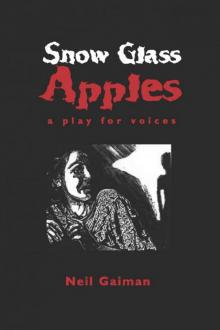 Snow, Glass, Apples
Snow, Glass, Apples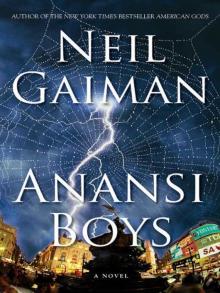 Anansi Boys
Anansi Boys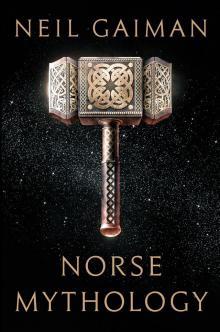 Norse Mythology
Norse Mythology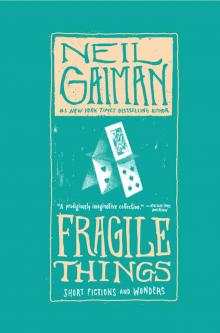 Fragile Things: Short Fictions and Wonders
Fragile Things: Short Fictions and Wonders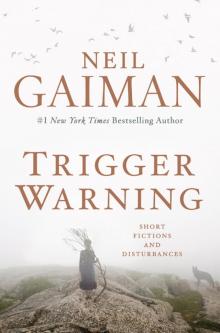 Trigger Warning: Short Fictions and Disturbances
Trigger Warning: Short Fictions and Disturbances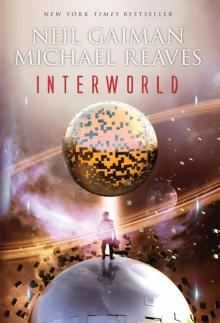 InterWorld
InterWorld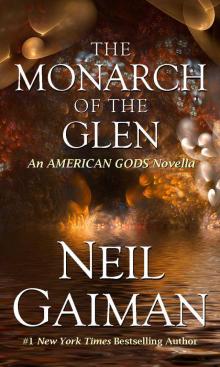 The Monarch of the Glen
The Monarch of the Glen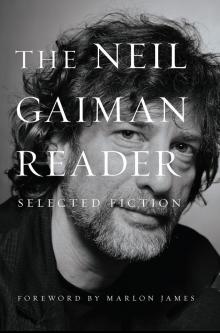 The Neil Gaiman Reader
The Neil Gaiman Reader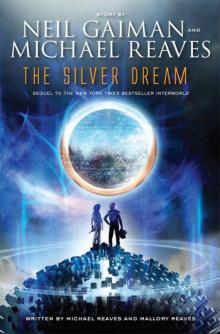 The Silver Dream
The Silver Dream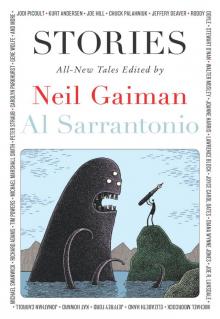 Stories
Stories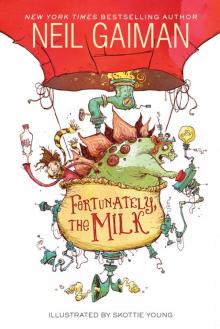 Fortunately, the Milk
Fortunately, the Milk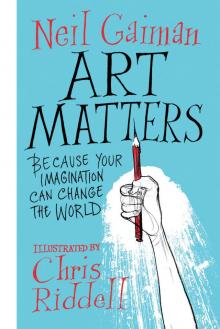 Art Matters
Art Matters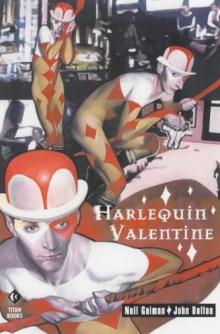 Harlequin Valentine
Harlequin Valentine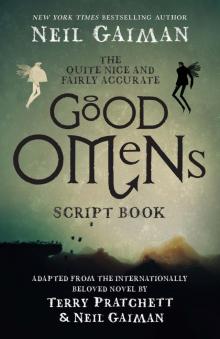 The Quite Nice and Fairly Accurate Good Omens Script Book
The Quite Nice and Fairly Accurate Good Omens Script Book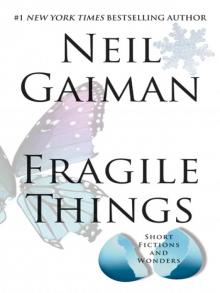 Fragile Things
Fragile Things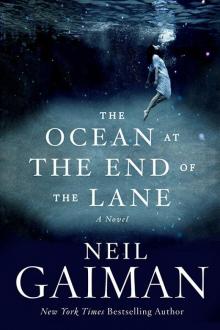 The Ocean at the End of the Lane: A Novel
The Ocean at the End of the Lane: A Novel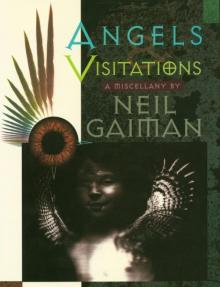 Angels and Visitations
Angels and Visitations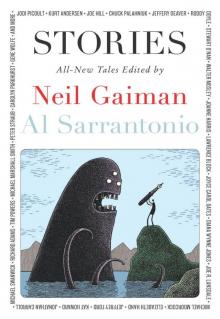 Stories: All-New Tales ngss-1
Stories: All-New Tales ngss-1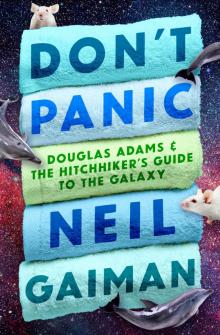 Don't Panic
Don't Panic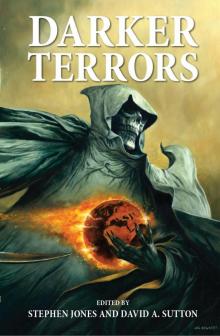 Darker Terrors
Darker Terrors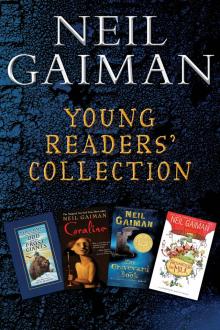 Neil Gaiman Young Readers' Collection
Neil Gaiman Young Readers' Collection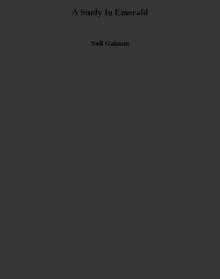 A Study In Emerald
A Study In Emerald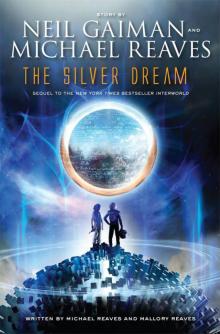 The Silver Dream: An InterWorld Novel
The Silver Dream: An InterWorld Novel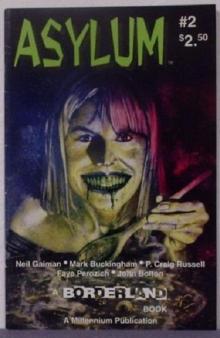 Feeders and Eaters
Feeders and Eaters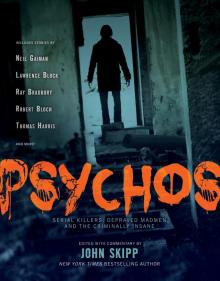 Psychos
Psychos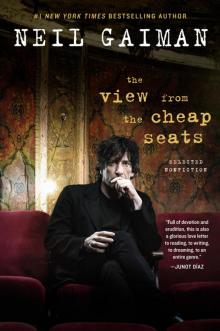 The View from the Cheap Seats
The View from the Cheap Seats Trigger Warning
Trigger Warning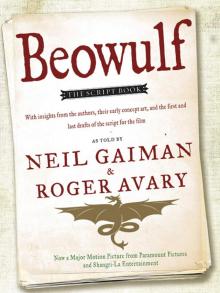 Beowulf
Beowulf Nessun Dove
Nessun Dove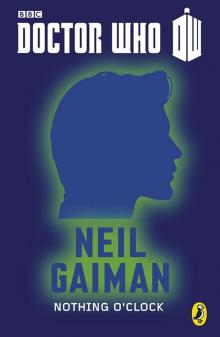 Doctor Who: Nothing O'Clock: Eleventh Doctor: 50th Anniversary
Doctor Who: Nothing O'Clock: Eleventh Doctor: 50th Anniversary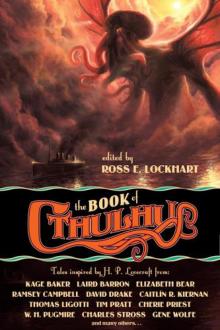 The Book of Cthulhu
The Book of Cthulhu